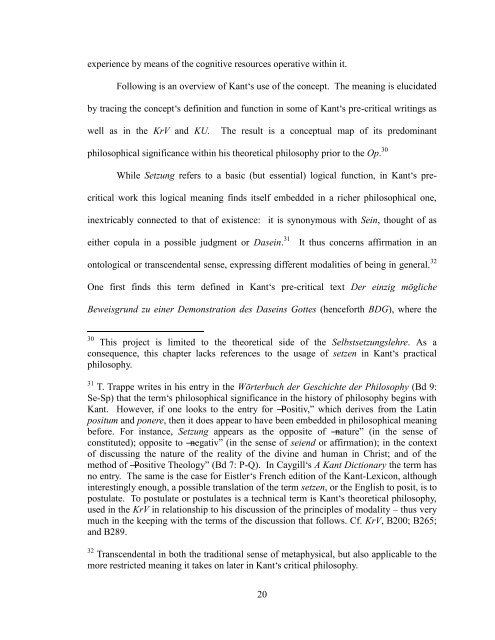The Doctrine of Self-positing and Receptivity in Kant's Late ...
The Doctrine of Self-positing and Receptivity in Kant's Late ...
The Doctrine of Self-positing and Receptivity in Kant's Late ...
You also want an ePaper? Increase the reach of your titles
YUMPU automatically turns print PDFs into web optimized ePapers that Google loves.
experience by means <strong>of</strong> the cognitive resources operative with<strong>in</strong> it.<br />
Follow<strong>in</strong>g is an overview <strong>of</strong> Kant‘s use <strong>of</strong> the concept. <strong>The</strong> mean<strong>in</strong>g is elucidated<br />
by trac<strong>in</strong>g the concept‘s def<strong>in</strong>ition <strong>and</strong> function <strong>in</strong> some <strong>of</strong> Kant‘s pre-critical writ<strong>in</strong>gs as<br />
well as <strong>in</strong> the KrV <strong>and</strong> KU. <strong>The</strong> result is a conceptual map <strong>of</strong> its predom<strong>in</strong>ant<br />
philosophical significance with<strong>in</strong> his theoretical philosophy prior to the Op. 30<br />
While Setzung refers to a basic (but essential) logical function, <strong>in</strong> Kant‘s pre-<br />
critical work this logical mean<strong>in</strong>g f<strong>in</strong>ds itself embedded <strong>in</strong> a richer philosophical one,<br />
<strong>in</strong>extricably connected to that <strong>of</strong> existence: it is synonymous with Se<strong>in</strong>, thought <strong>of</strong> as<br />
either copula <strong>in</strong> a possible judgment or Dase<strong>in</strong>. 31 It thus concerns affirmation <strong>in</strong> an<br />
ontological or transcendental sense, express<strong>in</strong>g different modalities <strong>of</strong> be<strong>in</strong>g <strong>in</strong> general. 32<br />
One first f<strong>in</strong>ds this term def<strong>in</strong>ed <strong>in</strong> Kant‘s pre-critical text Der e<strong>in</strong>zig mögliche<br />
Beweisgrund zu e<strong>in</strong>er Demonstration des Dase<strong>in</strong>s Gottes (henceforth BDG), where the<br />
30 This project is limited to the theoretical side <strong>of</strong> the Selbstsetzungslehre. As a<br />
consequence, this chapter lacks references to the usage <strong>of</strong> setzen <strong>in</strong> Kant‘s practical<br />
philosophy.<br />
31 T. Trappe writes <strong>in</strong> his entry <strong>in</strong> the Wörterbuch der Geschichte der Philosophy (Bd 9:<br />
Se-Sp) that the term‘s philosophical significance <strong>in</strong> the history <strong>of</strong> philosophy beg<strong>in</strong>s with<br />
Kant. However, if one looks to the entry for ―Positiv,‖ which derives from the Lat<strong>in</strong><br />
positum <strong>and</strong> ponere, then it does appear to have been embedded <strong>in</strong> philosophical mean<strong>in</strong>g<br />
before. For <strong>in</strong>stance, Setzung appears as the opposite <strong>of</strong> ―nature‖ (<strong>in</strong> the sense <strong>of</strong><br />
constituted); opposite to ―negativ‖ (<strong>in</strong> the sense <strong>of</strong> seiend or affirmation); <strong>in</strong> the context<br />
<strong>of</strong> discuss<strong>in</strong>g the nature <strong>of</strong> the reality <strong>of</strong> the div<strong>in</strong>e <strong>and</strong> human <strong>in</strong> Christ; <strong>and</strong> <strong>of</strong> the<br />
method <strong>of</strong> ―Positive <strong>The</strong>ology‖ (Bd 7: P-Q). In Caygill‘s A Kant Dictionary the term has<br />
no entry. <strong>The</strong> same is the case for Eistler‘s French edition <strong>of</strong> the Kant-Lexicon, although<br />
<strong>in</strong>terest<strong>in</strong>gly enough, a possible translation <strong>of</strong> the term setzen, or the English to posit, is to<br />
postulate. To postulate or postulates is a technical term is Kant‘s theoretical philosophy,<br />
used <strong>in</strong> the KrV <strong>in</strong> relationship to his discussion <strong>of</strong> the pr<strong>in</strong>ciples <strong>of</strong> modality – thus very<br />
much <strong>in</strong> the keep<strong>in</strong>g with the terms <strong>of</strong> the discussion that follows. Cf. KrV, B200; B265;<br />
<strong>and</strong> B289.<br />
32 Transcendental <strong>in</strong> both the traditional sense <strong>of</strong> metaphysical, but also applicable to the<br />
more restricted mean<strong>in</strong>g it takes on later <strong>in</strong> Kant‘s critical philosophy.<br />
20


